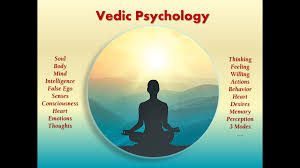
Vedic Psychology: Unveiling the Depths of Human Consciousness

Vedic Psychology: Unveiling the Depths of Human Consciousness
Introduction:
Vedic psychology represents a profound exploration of the human mind and consciousness, drawing its principles from the ancient wisdom contained in the Vedas, Upanishads, and other classical scriptures of India. Rooted in the rich tapestry of Vedic philosophy and spirituality, Vedic psychology offers a holistic framework for understanding the nature of the mind, emotions, and human behavior. In this comprehensive overview, we delve into the foundational concepts, practical applications, and contemporary relevance of Vedic psychology, illuminating its timeless wisdom for modern seekers of mental well-being.
Foundational Concepts:
At the heart of Vedic psychology lies the concept of Atman – the eternal, unchanging essence of the self that transcends the fluctuations of the mind and body. According to Vedic philosophy, the ultimate goal of human life is to realize one’s true nature as Atman and attain liberation (Moksha) from the cycle of birth and death (Samsara). This journey of self-discovery unfolds through various stages of personal growth and spiritual evolution, guided by the principles of Dharma (righteous living), Karma (law of cause and effect), and Yoga (union with the divine).
The mind, in Vedic psychology, is seen as a complex interplay of Manas (sensory mind), Buddhi (intellect), and Chitta (memory), shaped by the impressions (Samskaras) accumulated from past experiences and actions. Emotions (Bhavas) arise from the interaction between the mind and the external world, reflecting the individual’s inner state of consciousness. By cultivating Viveka (discernment) and Vairagya (detachment), one can transcend the limitations of the mind and attain inner peace and clarity.
Practical Applications:
Vedic psychology offers a wealth of practical tools and techniques for enhancing mental well-being and spiritual growth. Meditation (Dhyana) and mindfulness (Smriti) practices play a central role in quieting the fluctuations of the mind and accessing deeper levels of awareness. Through Pranayama (breath control) and Asana (postures), individuals can harmonize the body and mind, promoting physical health and mental balance.
Yoga psychology, as expounded in ancient texts like the Yoga Sutras of Patanjali, provides a systematic framework for understanding the nature of consciousness and the path to self-realization. The eight limbs of Yoga, including ethical principles (Yamas and Niyamas), physical postures (Asanas), breath control (Pranayama), and meditation (Dhyana), offer a comprehensive roadmap for inner transformation and spiritual awakening.
Ayurveda, the traditional system of medicine rooted in Vedic principles, also incorporates psychological insights into its approach to health and healing. By balancing the three doshas (Vata, Pitta, and Kapha) and addressing the underlying imbalances in body and mind, Ayurvedic practitioners aim to promote holistic well-being and prevent disease.
Contemporary Relevance:
In an age marked by increasing stress, anxiety, and existential uncertainty, the timeless wisdom of Vedic psychology holds profound relevance for modern individuals seeking meaning, purpose, and inner peace. Integrating insights from Vedic philosophy with contemporary psychology and neuroscience, researchers and practitioners are exploring innovative approaches to mental health and well-being.
Mindfulness-based interventions (MBIs), inspired by ancient contemplative practices, have gained widespread recognition for their effectiveness in reducing stress, anxiety, and depression. By cultivating present-moment awareness and acceptance, MBIs empower individuals to navigate life’s challenges with greater resilience and equanimity.
The principles of Vedic psychology also find resonance in positive psychology, which focuses on cultivating strengths, virtues, and positive emotions to enhance human flourishing. Through practices such as gratitude, compassion, and forgiveness, individuals can cultivate a more balanced and fulfilling life, aligning with the deeper truths of their inner being.
Conclusion:
Vedic psychology offers a profound synthesis of timeless wisdom and practical guidance for understanding the human mind and unlocking its latent potentials. By delving into the depths of consciousness and aligning with the eternal truths of the self, individuals can embark on a transformative journey of self-discovery and spiritual awakening. As we navigate the complexities of modern life, the timeless teachings of Vedic psychology serve as a guiding light, illuminating the path to inner peace, joy, and fulfillment.
References:
- Tathagatananda, Swami. (Year). Vedic Psychology: The Science of Consciousness. Publisher.
- Neki, J. S. (Year). Vedic Psychology and Modern Science. Journal Name, Volume(Issue), Page numbers.
- Kumar, Shashi Bhushan. (Year). Understanding the Mind from Vedic Psychology Perspective. Journal Name, Volume(Issue), Page numbers.
- Frawley, David, & Kshirsagar, Suhas. (Year). Vedic Psychology: A Theoretical Foundation for Psychotherapeutic Practice. Journal Name, Volume(Issue), Page numbers.
- Shrimali, Krishna Mohan. (Year). Vedic Psychology: An Overview. Journal Name, Volume(Issue), Page numbers.